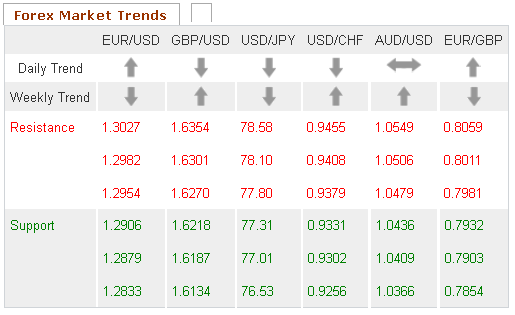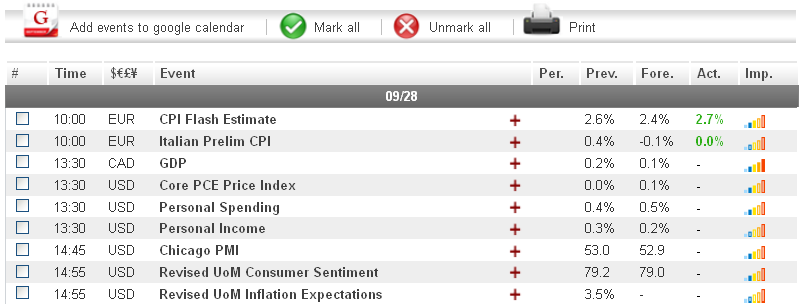Concerns regarding Spain and Greece's ability to tackle their debt issues caused the euro to extend its recent bearish trend throughout the day yesterday. Crude oil saw fairly significant gains during the first half of the day due to an increase in Middle East tensions, but its upward movement was halted following the release of disappointing news out of the US. As markets get ready to close for the weekend, traders should note that a lack of significant news out of the US and euro-zone may lead to erratic price shifts in the marketplace. In addition, any announcements concerning the debt situation in Spain or Greece could lead to heavy volatility.
Economic News
USD - Disappointing US Data Leads to Temporary Dollar Losses
A batch of disappointing US data yesterday caused the US dollar to temporarily reverse its recent bullish trend against several of its main currency rivals. That being said, euro-zone concerns resulted in investors shifting their funds to safe-haven assets, giving the greenback a boost during afternoon trading. The USD/CHF fell more than 30 pips during the first half of the day to trade as low as 0.9371 before bouncing back to 0.9415 toward the end of the European session. The GBP/USD gained approximately 45 pips to trade as high as 1.6234, before a reversal brought the pair to 1.6190 later in the day.
As markets get ready to close for the weekend, a lack of significant US news means that any dollar movement is likely to come as a result of announcements out of the euro-zone. Traders will want to continue monitoring developments in the region to see if risk aversion will continue to dominate market sentiment. Next week, traders should not forget that the all-important US Non-Farm Employment Change is scheduled to be released, and is likely to generate heavy market volatility as a result.
EUR - Spain, Greece Keep EUR near Recent Lows
The euro spent most of the European session yesterday near a two-week low against the US dollar and Japanese yen, as questions regarding the debt situations in Spain and Greece resulted in investors shifting their funds away from higher-yielding assets. The EUR/USD fell close to 60 pips over the course of the day, eventually dropping below the 1.2827 level. Against the JPY, the euro sunk more than 40 pips eventually trading just above the 99.60 level.
Today, euro traders will want to continue monitoring developments out of both Spain and Greece, as the two countries remain the biggest obstacles to the euro-zone economic recovery at this time. Any positive developments could help the common-currency recover from some of its recent losses. Next week, traders will want to remember to pay attention to the EU Minimum Bid Rate and ECB Press Conference, as they are likely to offer important clues as to the current state of the economic recovery in the region.
Gold - Gold Rebounds from 2-Week Low
After hitting a two-week low earlier in the week, gold was able to stage an upward correction yesterday after mixed US news temporarily weakened the USD. Overall, the precious metal gained more than $15 an ounce during mid-day trading, eventually reaching as high as $1768, where it largely remained for the rest of European trading.
As we begin to close out the week, a lack of significant news out of the US means that any change in the price of gold is likely to come from announcements out of the euro-zone. With the debt situations in Spain and Greece still fragile to say the least, gold may have a hard time maintaining yesterday's gains if there are any signs that the debt crisis in the region is worsening.
Crude Oil - Disappointing US News Causes Oil to Reverse Gains
Supply side fears due to escalating tensions in the Middle East led to a sharp increase in the price of oil during the first half of the day yesterday. That being said, gains were limited after a set of disappointing news out of the US led to speculation that American demand for oil may drop. Oil peaked at $91.71, up around $1.60 a barrel, before staging a slight downward reversal and stabilizing at the $91.30 level.
Turning to today, traders will want to pay attention to announcements out of the euro-zone which could impact risk taking among investors. Any positive developments out of either Greece or Spain with regards to their respective debt issues could cause investors to shift their funds to higher-yielding assets, which may boost the price of oil.
Technical News
EUR/USD
The Bollinger Bands on the weekly chart are beginning to narrow, indicating that a major price shift could occur in the coming days. A bearish cross on the same chart's Slow Stochastic signals that the price shift could be downward. Opening short positions may be the wise choice for this pair.
GBP/USD
The weekly chart's Slow Stochastic has formed a bearish cross, indicating that this pair could see downward movement in the coming days. Furthermore, the Williams Percent Range on the same chart has crossed into overbought territory. Traders may want to open short positions for this pair.
USD/JPY
Both the Relative Strength Index and Williams Percent Range on the weekly chart are approaching oversold territory. Traders will want to keep an eye on both of these indicators. If they cross below the oversold line, it may be a sign of impending upward movement.
USD/CHF
While a bullish cross has formed on the weekly chart's Slow Stochastic, most other long-term technical indicators place this pair in neutral territory. Traders may want to take a wait and see approach for this pair, as a clearer picture is likely to present itself in the near future.
The Wild Card
USD/DKK
In a sign that this pair could see a price shift in the near future, the Bollinger Bands on the daily chart are narrowing. Furthermore, the Williams Percent Range on the same chart has crossed over into overbought territory, indicating that the price shift could be downward. This may be a good time for forex traders to open short positions ahead of a bearish correction. 
- English (UK)
- English (India)
- English (Canada)
- English (Australia)
- English (South Africa)
- English (Philippines)
- English (Nigeria)
- Deutsch
- Español (España)
- Español (México)
- Français
- Italiano
- Nederlands
- Português (Portugal)
- Polski
- Português (Brasil)
- Русский
- Türkçe
- العربية
- Ελληνικά
- Svenska
- Suomi
- עברית
- 日本語
- 한국어
- 简体中文
- 繁體中文
- Bahasa Indonesia
- Bahasa Melayu
- ไทย
- Tiếng Việt
- हिंदी
Euro Extends Bearish Trend
Published 09/28/2012, 05:37 AM
Updated 02/20/2017, 07:55 AM
Euro Extends Bearish Trend
Latest comments
Loading next article…
Install Our App
Risk Disclosure: Trading in financial instruments and/or cryptocurrencies involves high risks including the risk of losing some, or all, of your investment amount, and may not be suitable for all investors. Prices of cryptocurrencies are extremely volatile and may be affected by external factors such as financial, regulatory or political events. Trading on margin increases the financial risks.
Before deciding to trade in financial instrument or cryptocurrencies you should be fully informed of the risks and costs associated with trading the financial markets, carefully consider your investment objectives, level of experience, and risk appetite, and seek professional advice where needed.
Fusion Media would like to remind you that the data contained in this website is not necessarily real-time nor accurate. The data and prices on the website are not necessarily provided by any market or exchange, but may be provided by market makers, and so prices may not be accurate and may differ from the actual price at any given market, meaning prices are indicative and not appropriate for trading purposes. Fusion Media and any provider of the data contained in this website will not accept liability for any loss or damage as a result of your trading, or your reliance on the information contained within this website.
It is prohibited to use, store, reproduce, display, modify, transmit or distribute the data contained in this website without the explicit prior written permission of Fusion Media and/or the data provider. All intellectual property rights are reserved by the providers and/or the exchange providing the data contained in this website.
Fusion Media may be compensated by the advertisers that appear on the website, based on your interaction with the advertisements or advertisers.
Before deciding to trade in financial instrument or cryptocurrencies you should be fully informed of the risks and costs associated with trading the financial markets, carefully consider your investment objectives, level of experience, and risk appetite, and seek professional advice where needed.
Fusion Media would like to remind you that the data contained in this website is not necessarily real-time nor accurate. The data and prices on the website are not necessarily provided by any market or exchange, but may be provided by market makers, and so prices may not be accurate and may differ from the actual price at any given market, meaning prices are indicative and not appropriate for trading purposes. Fusion Media and any provider of the data contained in this website will not accept liability for any loss or damage as a result of your trading, or your reliance on the information contained within this website.
It is prohibited to use, store, reproduce, display, modify, transmit or distribute the data contained in this website without the explicit prior written permission of Fusion Media and/or the data provider. All intellectual property rights are reserved by the providers and/or the exchange providing the data contained in this website.
Fusion Media may be compensated by the advertisers that appear on the website, based on your interaction with the advertisements or advertisers.
© 2007-2025 - Fusion Media Limited. All Rights Reserved.
